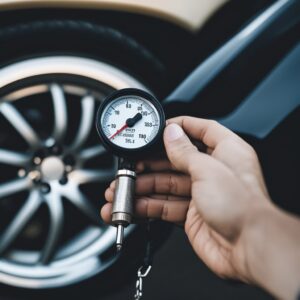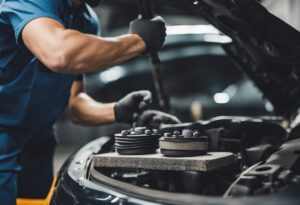Are you tired of constantly having to repair or replace your car? Do you want to keep your vehicle running smoothly and efficiently for years to come? Look no further, as we have compiled a list of 5 essential tips to help make your car last longer. Follow these simple guidelines and save yourself time, money, and hassle in the long run.
Tip #1: Regular Maintenance is Key
The key to ensuring a long life for your vehicle is regular maintenance. Just like how we need check-ups at the doctor’s office, cars too require routine inspections and tune-ups. This includes oil changes, tire rotations, and fluid top-ups.
Regular maintenance not only keeps your car running smoothly but also allows for early detection of any potential issues that could cause major damage if left unchecked. It may seem like an extra expense, but it can save you a lot of money in the long run by preventing costly repairs.
Tip #2: Keep It Clean
A clean car not only looks good, but it also helps to extend its lifespan. Dirt, grime, and salt can cause damage to the exterior of your car, leading to rust and corrosion. Regularly washing your car and keeping the interior clean can prevent this from happening.
Additionally, cleaning the engine bay can help prevent build-up of debris that could potentially cause overheating or other mechanical issues. So next time you’re at the car wash, don’t neglect the engine bay.
Properly disposing of trash and debris in your car can also prevent unwanted smells and potential pest infestations. Keeping a small trash bag or container in your car can help you easily dispose of any waste while on the go.
Regular cleaning and maintenance not only keep your car looking good, but it also helps to maintain its value. A well-maintained vehicle will have a higher resale value, making it a wise investment in the long run.
Tip #3: Drive Smarter
The way you drive can also impact the lifespan of your car. Aggressive driving, such as speeding and sudden braking, can put unnecessary strain on your engine and other components. This can lead to increased wear and tear, reducing the life expectancy of your vehicle.
By driving smarter and maintaining a steady speed, you can improve fuel efficiency and reduce wear on your engine. Avoiding potholes and rough roads can also help prevent damage to your tires and suspension system.
Tip #4: Use High-Quality Fuel and Products
Using high-quality fuel and products can also play a significant role in extending your car’s lifespan. While cheaper options may save you money in the short term, they could cause damage to your engine or other components in the long run.
Investing in top-grade motor oil, filters, and other maintenance products can help keep your car running smoothly and efficiently for longer periods. Similarly, using higher-grade gasoline can prevent the build-up of carbon deposits and prolong the life of your engine.
Another important aspect to consider is avoiding counterfeit or low-quality products. These may seem like a bargain at first, but they can potentially harm your vehicle and end up costing you more in repairs down the line. Make sure to purchase from reputable and trusted brands, and always read reviews before making a purchase.
Tip #5: Store It Properly
How you store your car can also impact its lifespan. Extreme temperatures, whether hot or cold, can affect the performance and condition of your vehicle over time. Whenever possible, try to park in a garage or covered area to protect it from harsh weather conditions. If this is not an option, invest in a quality car cover to provide some protection against the elements.
Additionally, if you plan on storing your car for an extended period, make sure to properly prepare it beforehand by following these steps:
- Wash and wax the exterior.
- Change the oil and top up all fluids.
- Fill up the gas tank to prevent moisture build-up.
- Inflate tires to the recommended pressure.
- Disconnect the battery to avoid drainage.
By properly storing your car, you can help maintain its condition and extend its lifespan.
Tip #6: Bonus Tip – Be Mindful of Your Car’s Age
It’s important to keep in mind that no matter how well you maintain your car, it will eventually reach a point where repairs and replacements become necessary. This is especially true for older cars with high mileage. It’s crucial to be mindful of your car’s age and plan accordingly for future expenses. Regularly check for signs of wear and tear, such as rust, leaks, and worn-out parts. Consider taking your car to a mechanic for a thorough inspection every few years.
Another factor to consider is the availability of replacement parts for your specific make and model of car. As cars age, certain parts may become harder to find or more expensive to replace. This is something to keep in mind when budgeting for future repairs.
In addition, older cars tend to have lower fuel efficiency and may not have the same safety features as newer models. So while it’s important to take care of your car, it’s also important to know when it may be time to invest in a new one for your own safety and convenience.
Conclusion
By following these tips, you can help extend the life of your car and save yourself time, money, and stress. Regular maintenance, proper cleaning and care, smart driving habits, using high-quality products, storing properly, and being mindful of your car’s age are all essential factors in making your car last longer. So take good care of your vehicle, and it will continue to serve you well for years to come.
Frequently Asked Questions (FAQs)
1. How often should I change the oil in my car?
It’s generally recommended to change your car’s oil every 3,000 to 5,000 miles, but this can vary based on the type of oil used, your driving habits, and your vehicle’s manufacturer recommendations. Always consult your owner’s manual for specific guidance.
2. What type of gasoline should I use for my car?
Check your owner’s manual for the recommended octane rating for your car. Most vehicles run efficiently on regular unleaded gasoline, but high-performance engines might require premium fuel for optimal performance.
3. How can I improve the fuel efficiency of my car?
You can improve fuel efficiency by maintaining steady driving speeds, avoiding excessive idling, regularly maintaining your vehicle, keeping tires properly inflated, and reducing unnecessary weight in your car.
4. How often should I rotate my tires?
Tire rotation is typically recommended every 6,000 to 8,000 miles. Regular rotations help ensure even tire wear, which can extend the life of your tires and improve your vehicle’s handling.
5. How do I know if my car battery needs to be replaced?
Common signs of a failing car battery include difficulty starting the engine, dim headlights, and electrical issues. Car batteries generally last between 3 to 5 years, but this can vary based on driving conditions and climate.
6. What should I do if my check engine light comes on?
If your check engine light comes on, it’s important to have your vehicle inspected by a mechanic as soon as possible. While it may be a minor issue, it could also indicate a more serious problem that needs immediate attention.
7. How often should I replace my air filter?
Replacing your air filter every 12,000 to 15,000 miles is typically recommended. However, if you drive in dusty conditions or heavy traffic frequently, you may need to replace it more often. A clean air filter helps your engine run more efficiently.
8. Why is it important to keep my car clean inside and out?
Regular cleaning helps maintain your car’s appearance, prevents rust and corrosion, and protects the paintwork. Inside cleaning reduces clutter, prevents the build-up of allergens, and keeps the car smelling fresh, contributing to a more enjoyable driving experience.




